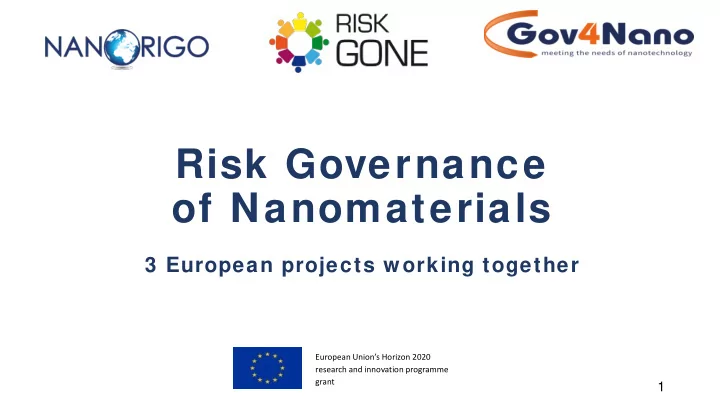

Risk Governance of Nanomaterials 3 European projects working together European Union’s Horizon 2020 research and innovation programme grant 1
Innovation Production Risk Regulations Benefits Perception Communication European Union’s Horizon 2020 research and innovation programme grant 2
Exposure Risk Hazard Governance Perception Communication European Union’s Horizon 2020 research and innovation programme grant 3
Challenge • Nanotechnology impacts a broad range of industries and applications • Interaction of engineered nanomaterials w ith the living environment is complex and is marked by uncertainty and ambiguity • Urgent need to develop appropriate governance structures, to ensure the trust of all stakeholders European Union’s Horizon 2020 research and innovation programme grant 4
NANORIGO – Gov4Nano – RiskGONE NanoInformaTIX - NanoSolveIT We must play together European Union’s Horizon 2020 research and innovation programme grant 5
FAST FACTS Financial resources H2020 Projects Budget: € 18.3 million Duration January 2019 – February 2023 Collaboration 3 projects 82 partners 17 EU countries, Brazil, India, Iran, Switzerland, South Africa, South Korea and USA European Union’s Horizon 2020 research and innovation programme grant 6
Supporting Risk Governance Infrastructure Framework for data, tools & decision making instruments Nano Risk Governance Council European Union’s Horizon 2020 research and innovation programme 7 grant
Outcome • Self-sustained European Risk Governance Council • Proof of concept of an effective risk governance process • Operational Nanotechnology Risk Governance Framew ork • NanoSafety Governance Portal • Demonstrate functioning of the Council European Union’s Horizon 2020 research and innovation programme grant 8
Nano Risk Governance Framework • Decision making framew ork for Council • Future-proof based on International Risk Governance Council • Integrates scientific data and operational tools • Participative and pro-active role for stakeholders • Based on existing infrastructure • All domains: chemicals, biocides, consumers, food, medicine • Connecting key organizations and stakeholders (EU and global) European Union’s Horizon 2020 research and innovation programme grant
Nano Safety Governance Portal • Infrastructure integrates academic, industry and regulatory information • Support decision making framew ork & council • Validated state-of-the-art tools • NANoREG, caLIBRAte, NanoCommons & NanoReg2 • QA/QC processes and decision tree • Process for collection and harmonisation of data • Covers applicability and acceptance (regulatory or industrial) European Union’s Horizon 2020 research and innovation programme grant
Data management (incl. NMBP-14 projects) • FAIR – EHS data infrastructure F indable, A ccessible, I nteroperable and R eusable • Computation platforms allow easy access to curated data • Easy uploading, Quality Assessment e.g. Mutual Acceptance of Data (OECD) • Build on NanoCommons and w ork tow ards machine learning European Union’s Horizon 2020 research and innovation programme grant 11
Scientific support for harmonised testguidelines • Collaboration w ith Malta Initiative to join (EU) forces • Nano-specific adaptations of OECD TG/GD • Dedicated regulatory risk research & experimental w ork • Specific endpoints to be addressed: surface chemistry, solubility, reactivity and dustiness of nanomaterials European Union’s Horizon 2020 research and innovation programme grant
The Malta Initiative A joint route towards standardisation, testing guidelines and guidance documents. European Union’s Horizon 2020 research and innovation programme grant 13
Nanotechnology Risk Governance Council • Governance Council to put the framew ork into practice • Overarching, independent, trustw orthy body • Bridge betw een know ledge generators and decision makers • Services for all stakeholders European Union’s Horizon 2020 research and innovation programme grant
Monique Groenewold monique.groenewold@rivm.nl Janeck James Scott-Fordsmand jsf@bios.au.dk Maria Dusinska maria.dusinska@nilu.no European Union’s Horizon 2020 research and innovation programme grant 15
Recommend
More recommend